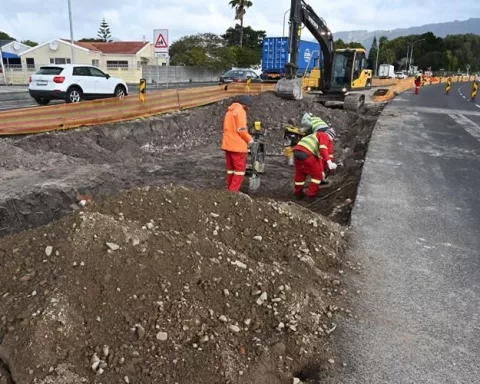The Urban Mobility Directorate of Cape Town is making great strides in enhancing mobility through road network improvements, transport system expansion, and public transport interchanges. Their MyCiTi bus service has seen a significant increase in ridership, and multiple projects are underway to alleviate congestion and improve traffic flow. The directorate’s dedication to practical solutions and cutting-edge advancements is shaping a legacy of innovation in urban mobility, fueling the city’s dynamic life flow and creating a conducive environment for residents to reach their workplaces and schools on time.
How is the Urban Mobility Directorate of Cape Town enhancing mobility?
The Urban Mobility Directorate of Cape Town is committed to enhancing mobility through road network improvements, transport system expansion, and public transport interchanges. Their MyCiTi bus service has seen a 68% surge in ridership, and several projects are in progress to alleviate congestion and improve traffic flow. The directorate’s dedication to practical solutions and cutting-edge advancements is shaping a legacy of innovation in urban mobility.
The Urban Mobility Directorate of Cape Town is actively shaping a legacy of practical solutions and cutting-edge advancements with projects that aptly address routine mobility challenges. Fueling the city’s dynamic life flow of people, goods, and services, the directorate’s daring leaps forward are reflected in the meticulously curated and expanding road network, and the notable enhancement in public transportation services.
Commitment to Residents: Road Network Enhancement
Venture into the core of Cape Town’s bustling streets, and you’ll see a testament to outstanding maintenance and tactical planning. From July 2020, nearly 96,000 potholes have been remedied, and over 210 km of roads have been refreshed from January to December 2023. This is an enormous accomplishment, as the city carries the responsibility of a massive road network that extends over 10,700 km – an invaluable asset that loudly proclaims the city’s dedication to its inhabitant.
The persistent and wide-ranging efforts of the directorate are undeniable, as I’ve had the privilege of witnessing weekly, by visiting various locations where roads were being built, traffic lights and potholes mended, stormwater drains unclogged, and new infrastructure for the growing MyCiTi bus service was being constructed. While the collective triumphs may seem minor when looked at individually, the total progress made over the course of a year is nothing less than extraordinary.
Building a Conducive Environment: Transport System Expansion
Economic advancement, job creation, and productivity are closely related to a city’s transport framework. Recognizing this essential truth, the directorate is proactively constructing new roads, broadening existing ones, and launching walking and cycling lanes throughout the city to alleviate traffic congestion. Their strategy aims to create a conducive environment for residents to reach their workplaces and schools on time, relying on transportation that is reliable, secure, and affordable.
Growth in Ridership: MyCiTi Bus Service
The cornerstone of this vision is the MyCiTi bus service, which reported an impressive 18,323,763 passenger trips from July 2022 to June 2023, marking a 68% surge in ridership since 2021. The following six months saw an additional 9,172,877 passenger trips, a concrete indicator of the growing public trust in the service. The MyCiTi bus service is more than just a means of transport; it represents a sustainable solution to escalating fuel costs, traffic congestion, and CO2 emissions.
The MyCiTi service is expanding its coverage to the metro-south east, with plans for Mitchells Plain and Khayelitsha residents to have access to scheduled, safe, affordable, and reliable public transport to Wynberg and Claremont. Infrastructure projects in progress include an independently elevated traffic circle, a first in South Africa, and an innovative pedestrian bridge in Lentegeur. Several other projects are in the pipeline for this year, all aimed at enhancing the city’s transport landscape.
Alleviating Congestion: Projects in Progress
City congestion continues to pose a significant hurdle for Cape Town, a city that constantly pulls in more people seeking better lives and opportunities. Various projects intended to relieve congestion are either in the final stages of planning or already making significant strides. These include road link completions, highway enhancements, road extensions, and capacity expansions, each with the potential to dramatically improve traffic flow.
Looking beyond motorized transport, projects focusing on non-motorized transport are set to be rolled out by the end of 2024. These are planned for various locations, including Khayelitsha, Mitchells Plain, Gugulethu, Hanover Park, Heideveld, Kuils River, and Kensington.
Public Transport Interchanges: Significant Developments
Public Transport Interchanges (PTIs) have also seen significant developments. The new minibus-taxi facility in Somerset West PTI is nearing completion, while the Makhaza minibus-taxi facility was recently finished. Work is ongoing on the Bellville Transport Hub, with more developments in the pipeline.
Despite the lack of a functioning passenger rail service on major lines, the Rail Feasibility Study has made progress, with a consolidated baseline report finalized in October 2023. The National Treasury’s recent endorsement for the devolution of rail, housing, and bus service functions is an encouraging advancement.
Guiding Cape Town’s mobility future, the officials from the Urban Mobility Directorate remain resolute, driven, and inspired. The city is indeed in competent hands as it navigates the twisty trail of urban mobility.
1. How is the Urban Mobility Directorate of Cape Town enhancing mobility?
The Urban Mobility Directorate of Cape Town is enhancing mobility through road network improvements, transport system expansion, and public transport interchanges, including the MyCiTi bus service, which has seen a 68% surge in ridership.
2. What is the commitment of the Urban Mobility Directorate of Cape Town to residents?
The Urban Mobility Directorate of Cape Town is committed to enhancing the road network, including the remediation of nearly 96,000 potholes and refreshing over 210 km of roads from January to December 2023, to create a conducive environment for residents to reach their workplaces and schools on time.
3. What is the MyCiTi bus service, and how has it grown in recent years?
The MyCiTi bus service is a sustainable solution to escalating fuel costs, traffic congestion, and CO2 emissions, with 18,323,763 passenger trips from July 2022 to June 2023, marking a 68% surge in ridership since 2021.
4. What projects are underway to alleviate congestion in Cape Town?
Various projects intended to relieve congestion are either in the final stages of planning or already making significant strides, including road link completions, highway enhancements, road extensions, and capacity expansions, each with the potential to dramatically improve traffic flow.
5. What are the significant developments in Public Transport Interchanges (PTIs)?
Public Transport Interchanges (PTIs) have seen significant developments, with the new minibus-taxi facility in Somerset West PTI nearing completion, while the Makhaza minibus-taxi facility was recently finished. Work is ongoing on the Bellville Transport Hub, with more developments in the pipeline.
6. What is the focus of non-motorized transport projects in Cape Town?
Projects focusing on non-motorized transport are set to be rolled out by the end of 2024, planned for various locations, including Khayelitsha, Mitchells Plain, Gugulethu, Hanover Park, Heideveld, Kuils River, and Kensington.












